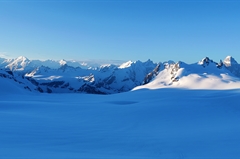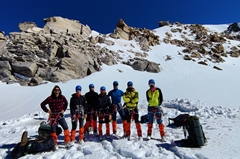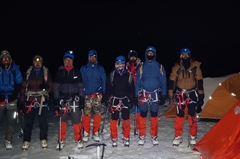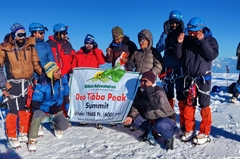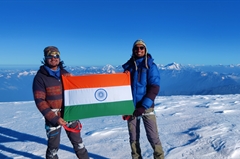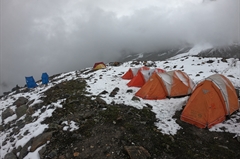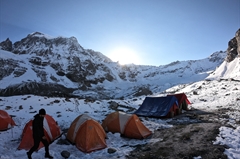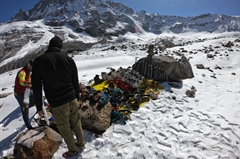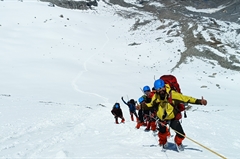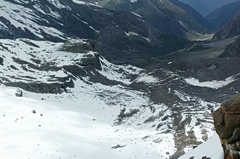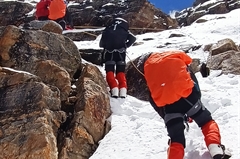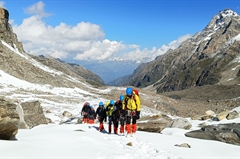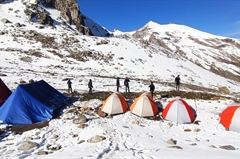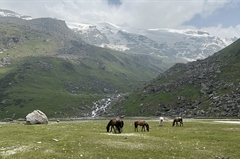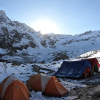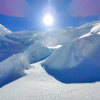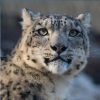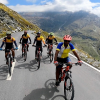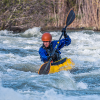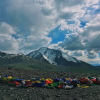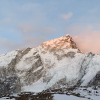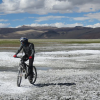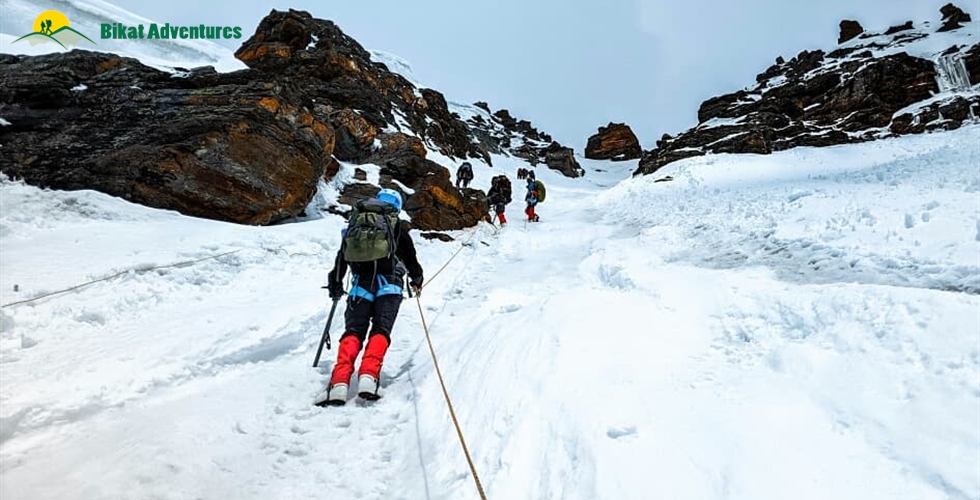
Mt. Deo Tibba Peak
The Perfect Technical Expedition Meant for Highly Experienced Trekkers Only
Available Batches
Available Batches
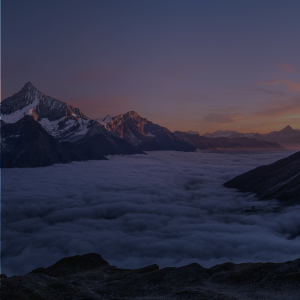

Brief Description
Brief Itinerary
Detailed Itinerary
Day 1: Make your way to Manali (2,050 M)
The trek starts from the town of Manali which is a very popular tourist destination and hence extremely accessible. If you need guidance on how to get to this high-altitude backpacking center, this article (click here) might come handy.
Day one is reserved for the participants to make their way into Manali and get settled into their accommodation in a Manali hotel. First half of the day is to get comfortable with the mountain air and each other. While the body acclimatizes, we take this time to get together with the group and delve into the happenings of the next few days - schedule, what to expect, basic do's and don'ts in the mountains, how to maintain the sanctity of the environment and such matters of importance.
Day 2: Rest and Acclimatization in Manali (2,050M)
We will spend a day in Manali to acclimatize the body to the altitude before heading on. Use this day to go over your packing list and buy gears and clothing that you might be missing. It is a good idea to move around the town in order to acclimatize your body better – so go out and explore the ins and outs of this small mountain town which has much to offer.
We also use this day to test out personal equipment like trying out snow boots for the right size and getting our crampons ready. This is essential for the right equipment is the deciding factor between success and failure of your expedition.
Day 3: Manali (2,050M) to Chikka (3,175M) (Click to View GPS data)
Distance: 20 kms + 4 kms
Duration: 1 hour drive + 2 hours trek
There’s no rush to leave today since it is a short day. We will be making our way to the large pastures of Chikka. To get there, we will need to drive up to the trail head – Khanol – which houses the Duhangan Hydro Project. The road to get to Khanol is not the best – you might want to eat light before the drive! It takes you in circles up 40 hairpin bends on loopy, kachcha, uneven mountain roads all the way till Khanol where all the expedition essentials will be loaded on mules. When the loopy road turns wavy, know that your drive is about to end. The trek from Khanol to Chikka is a short and pleasant walk along the Jagatsukh Nala through forested land all the way up to the open ground of Chikka.
Starting off by crossing a bridge over to the other side of the nala and patches through forested land, the trek to Chikka is mostly on flat terrain with a gradual incline and magnificent views in the background. The roughly marked trail which is easy to lose is a fair indication to the fact that the region does not receive a lot of footfall and is relatively raw as compared to other more popular trekking trails. Rife with fog, an assortment of fauna and random waterfalls that suddenly make an appearance along the trail, this trek is a walk in the park. The campsite is on the open pastoral land of Chikka, next to the noisy Jagatsukh Nala.
Day 4: Chikka (3,175M) to Seri (3,700M) (Click to View GPS data)
Distance: 9 kms
Duration: 5 hours trek
We leave early after an early breakfast today, latest by 9 AM. We continue alongside the Jagatsukh Nala. The day’s trek starts with gradual ascent under the canopy of a thick forested land for the first one hour. After an hour, the forests starts to thin out to give way to Birch trees and finally some bushes and high altitude grasslands. You will be welcomed into the grasslands carpeted with the brightest wildflowers you will see! With a few patches of old snow and a few patches of boulders, the ascent up from 3,175M to 3,700M is gradual – a little steep for the few hours the gradient starts to go down after the 3rd hour going down further at the end of the fourth hour with the land flattening out at the end of the fifth hour. The trail gets easier and the views get better due to a more open landscape. Walking alongside the nala, we pass a freshwater spring at Panduropa and Dudu Patthar until we reach the expansive grasslands at Seri with the Tainta cliffs towering to the left and the waterfalls crashing on the rocks below. We cross the zigzagging river twice to get to our campsite for the day. Remember to not let your shoes get wet while crossing the overzealous nala – remove them and hang them around your neck if that’s what it takes to keep them dry! We camp on the flatlands for the night with a massive waterfall right opposite the campsite.
We go for a one hour acclimatization walk in the early evening to get used to this new height. This is when we will see the dome of Deo Tibba for the first time.
Day 5: Seri (3,700M) to Tainta - Base Camp (4,480M) (Click to View GPS data)
Distance: 4 kms
Duration: 4-5 hours
We leave between 9 and 10 AM to continue our walk on the flat meadows of Seri followed by a stream crossing. We then start our climb up a 200M steep serpentine trail which zigzags up through grasslands with patches of big boulders eventually getting to a moraine field. There is one small patch of glacier crossing on the serpentine trail which can get slippery and may require extreme caution. The vegetation starts to thin out and now turns to tufts of brown, dried up grass and we now enter a field alternating between rocks and patches of snow spread across its floor. The last one hour to get to the campsite is on an almost flat land with not much of an incline. The campsite will be chosen based on the amount of snow in the season and availability of a water source nearby. As you explore around the campsite you will realize that the dome of Deo Tibba is right opposite from you and the site also aesthetic views of Jagatsukh Peak as a bonus.
We go for an acclimatization walk in the evening.
Day 6: Rest and Acclimatization at Base Camp (4,480M)
Today is reserved for acclimatization to the altitude since we gained quite a bit of height in the last few days and have also entered a much different terrain. We will also use the day to go to nearby slopes and practice our climbing techniques and get comfortable with our mountaineering equipment in the actual terrain in which we will be using them. So there are two things on the agenda for today – disbursement of personal equipment and ration that each person will be carrying in their sacks and second is to test out and practice with all the gear on actual slopes.
We will also be doing a small prayer at the base camp today praying to the mountain gods for a safe and successful summit.
There is a small high-altitude lake named Chota Chandratal which is an hour’s hike away from the Base Camp. If the weather permits, it is quite a rewarding place to trek to for today’s acclimatization walk.
Day 7 – Day 12: Expedition. Click to View GPS Data: (BC to Duhangan Col) (Duhangan Col to Summit Camp) (Summit Camp to Summit)
Since the conditions on high-altitude are unpredictable, there is a constant readjustment of plans to adapt to the situation at the time. Providing fixed day-wise schedules is thence tricky. Mt. Deo Tibba has 2 camps between base camp and the summit: Camp 1(5,100M), and Summit Camp (5,500M).
After the acclimatization routine suited to the conditions at the time and based on the rope fixing schedule as allowed by the weather, we occupy Summit Camp on Day 10, and will make our first summit attempt on Day 11. By Day 12, we aim to descend back down to Base Camp with an aim to depart from Manali by Day 13.
Base Camp (4,480M) to Camp 1 (5,100M): Camp 1 is at Duhangan Col and should take between 6-7 hours to get to. The route from Base Camp to Camp 1 starts on 30 degree slopes with a gradual incline to get to crampon point. Three and a half hours later, we reach the most difficult section of the climb which is a vertical ice gully with a gradient between 60-65 degrees. This section requires the use of fixed ropes and an ascender to climb. Camp 1 lies right on top of this gully which is likely to take between 2.5 to 3 hours to cross. The thrilling bit is that there is no place on the entire gully to take a break and rest yourself, which means that it is a patch of demanding and continuous ascent.
Camp 1 (5,100M) to Summit Camp (5,600M): There is yet another ice gully between Camp 1 and Summit Camp which needs to be navigated. Just as long as the one on the way to Camp 1, just as vertical and just as demanding, if not more. We hit the bottom of the gully two hours into the six hour climb to Summit Camp. We also encounter some very demanding patches of rock and a few knife ridges where the winds make it impossible to ignore your fear of falling on either side of the slippery trail.
Summit Camp (5,600M) to Summit (6,001M): The 400M to the summit from summit camp seem manageable after the two vertical ice gullies we crossed on our way to get here. The route to the summit is gentle humps, with the real challenge being the increasing altitude and the thinning air. There is one section that requires roping up with the rest of the route being gentle slopes.
Summit Camp (5,600M) Base Camp (4,480M): After returning from the summit push, we spend one night at Summit Camp – which is an open patch of land fully exposed to high speed winds. We head back down to Base Camp the next day which means navigating the knife ridges and the steep gullies one more time. Rappelling down this entire stretch should take us close to 5-6 hours. Expect to reach the sanctuary of your tents at Base Camp before sundown.
Day 13: Base Camp (4,480M) to Manali (2,050M) via Khanol (2,200M)
Distance: 18 kms + 20 kms
Duration: 5-6 hours trek + 1 hour drive
The last day of the trek involves tracing back our steps to where we started - from the Base Camp back to Manali through Seri and Chikka and eventually a drive back from our trailhead, Khanol. We start by 9 AM, so that we can reach a lower altitude as quickly as possible. The trek and drive included should take a couple of hours and reach us to Manali by early evening. Evening of the day is reserved for celebrating the joys and achievements of the last 12 days.
Day 14 and Day 15: Reserve Days
In case of bad weather or other difficulties which might set us off schedule during the course of the entire expedition, Day 14 and Day 15 are set as reserve days. These will only get used if unexpected and unforeseeable conditions present themselves at the last minute preventing us from reaching our destination as planned.
What's Included
- Food as per menu on the trek
- Forest Permits/Camping Charges, if any (upto the amount charged for Indian nationals)
- Tents, Sleeping bags, Sleeping mats
- Safety Equipment includes static rescue rope, seat harness, carabiners, pulleys
- Trek guide, cook, helpers, and porters for carrying common supplies
- Mountaineering course certified Trek Leader with Wilderness Emergency Responder & Rescue. course from NIM Uttarkashi
- Technical Equipment - Ropes, Helmet, Ice Axe, Crampons, Mountaineering Boots
- Accommodation in hotel in Manali on Day 1 and 2
What's Not Included
- Portage of personal bags during the trek
- Cost of any kind of Travel Insurance.
- Any Expense of personal nature.
- Any Expense not specified in the inclusions list.
- Meals during road journeys
- IMF Peak Booking Fee for foreign nationals USD 500 for a team of 2 members and USD 225 for every additional member up to 12 members.
- Mandatory Liaison Officer Fee for foreign expeditions ( ~USD 500 for group of 10)
- IMF deputed liaison officer is mandatory in case of foreign nationals. Expense of liaison officer is distributed amongst foreign nationals equally. Approximate total expense of LO : INR 15000/-
Are you Eligible for this Adventure?
Given the technical nature of its climb, its crevasse-ridden terrain and the altitude of the peaks, this expedition is for people with a fair bit of trekking experience in the Himalayas and a fair bit of technical knowledge pertaining to mountaineering equipment. A Basic Mountaineering Course certification is recommended but is not mandatory.
BRS Level Required
This makes it mandatory for you to have high-altitude experience of preferably multiple treks marked at level 6 on the BRS. The altitude, the terrain and the nature of the climb demand a certain level of skill and a need for you to be aware of how your body reacts to the various features of high altitude environment.
If you do not know what level of BRS trek would suit you best, worry not! Fill out this Form:
we will send you a progression chart to help you comfortably get out of your comfort zone in order to level up and ultimately reach your highest potential in the big, bad world of outdoor adventure.
Packing List
This is a list of essential items for individuals doing the trek with Bikat Adventures. This list contains only those items which the participants are required to bring with them. The list excludes those items which are provided by Bikat Adventures on the trek. We have divided the items into five categories. All the items in the list are essential except for those marked as optional.
Trekking Gear
- Ruck sack bag with rain cover. Qty -1
- Day Pack Bag - Recommended for treks with summit day
- Head Torch with spare Batteries. Qty -1
- U V protection sunglasses. Qty -1 Here is how you can choose the best sunglasses for trekking.
- Water Bottles: 2 bottles of 1 liter each
Footwear
- Non-skid, deep treaded, high-ankle trekking shoes Qty -1
- Pair of light weight Slipper/Sandals Qty -1
Clothing
- Quick Dry Warm lower or Track Pants. Qty - 2
- Full sleeves T-shirts/ Sweatshirts. 1 for every 2 days of trekking
- Pair of thick woolen socks. 1 pair for every two days of trekking
- Thermal Body warmer Upper & Lower. Qty-1
- Undergarments. Qty - 1 for every day of trekking
- Warm jacket closed at wrist & neck .Qty-1
- Full sleeves sweater. Qty -1
- Rain wear ( Jacket & Pants ) . Qty-1
- Pair of waterproof, warm gloves. Qty-1
- Woolen cap. Qty-1
- Sun shielding Hat. Qty -1
Toiletries
- Personal toiletries kit (Small Towel, Toilet paper, paper soap, Bar soap, toothbrush, toothpaste, cold cream, etc.)
- Sun screen lotion small pack. Qty -1 Here is your Sun Protection 101 to stay safe in the bright sunny outdoors.
- Lip Balm small pack. Qty-1
Utensils
- Small size, Light weight & Leak proof lunch box. Qty-1
- Plate. Qty- 1
- Spoon.Qty-1
- Tea/Coffee (plastic) Mug.Qty-1
Miscellaneous
- Camera (Optional)
- Carry your medicines in plenty in case you have any specific ailment. Consult your doctor before joining the trek.
- Dry fruits, Nuts, Chocolate bars (Optional)
Frequently Asked Questions
Why Bikat?
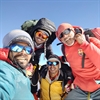

Small Group Size
Our batch sizes are capped at 15 for smaller treks with the trek leader and trekker ratio of 1:8. This ratio, in our years of experience, has proven to deliver the best trekking experience for individuals as well as groups. Capping the size of the group ensures individual attention to each trekker so that no signs of distress or need during the trek go unnoticed. It also helps to form a more cohesive cohort with better group energy which helps define the rhythm and pace of days on the trek. As you go higher up on the BRS scale, since the stakes are higher, expeditions have an even smaller group size with the ratio of expedition leader to climber set at 1:2.
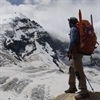

Qualified Expedition Leaders
We follow a rigorous regime of hiring and training our experts in the field. Each trek leader is a certified mountaineer with years of experience in the field. In addition to their qualification, they also go through practical and situational training to tackle any and all kinds of sudden conditions that may present themselves on the ground. Being unpredictable is the core nature of the mountains but being ready for any circumstance as best as possible is a controllable asset that we try to nurture. Our field experts are also trained in basic medicine and first-aid response. Watch: Forerunners - The Making of A Trek Leader At Bikat Adventures
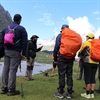

Guided Progression
Since Bikat Adventures is a learning-based organization, we help you climb up the ladder of difficulty within the sphere of outdoor adventure systematically. Our on-ground training modules are designed to handhold you through the upskilling process so that you are ready to take on bigger challenges.
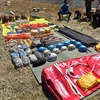

Equipment Quality and Check
All the gear used on our treks and expeditions is tried and tested, maintained for good quality, and is overall top-notch in quality and condition. We are continually looking to obtain the best of everything there is in the market so as to ensure optimum safety.
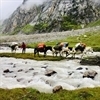

Support Systems
Along with the staff you see on-ground, we have a team of superheroes working in the background to give you the best experience possible. Our background team also comprises local staff from each area who know the region best. Having local support helps with studying the area, pre-planning, execution, and in receiving timely support in case of emergencies in these remote locations.
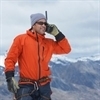

Communication
Our on-field staff is in constant contact with our teams based in primary locations so as to eliminate any avoidable delay in reaching additional help and support when required. We try to use the best tools for communication available, including satellite phones, in regions where they are not restricted.
What our customers Say
Cancellation Policy
Cash refund
Cancellations up to 60 days prior to departure date
Between 60 days to 20 days prior to departure date
Cancellations within 20 days prior to departure date
Voucher refund
Cancellations upto 60 days prior to departure date
Between 60 days upto 20 days prior to departure date
Between 20 days upto 5 days prior to departure date
Less than 5 days prior to departure date
- Cash refund is applicable only in case of bookings made without using any promotional offer code or Cancellation Vouchers or running discounts
- This is only a brief of cancellation terms. For finer details please refer Detailed Cancellation Policy.
Blog Posts
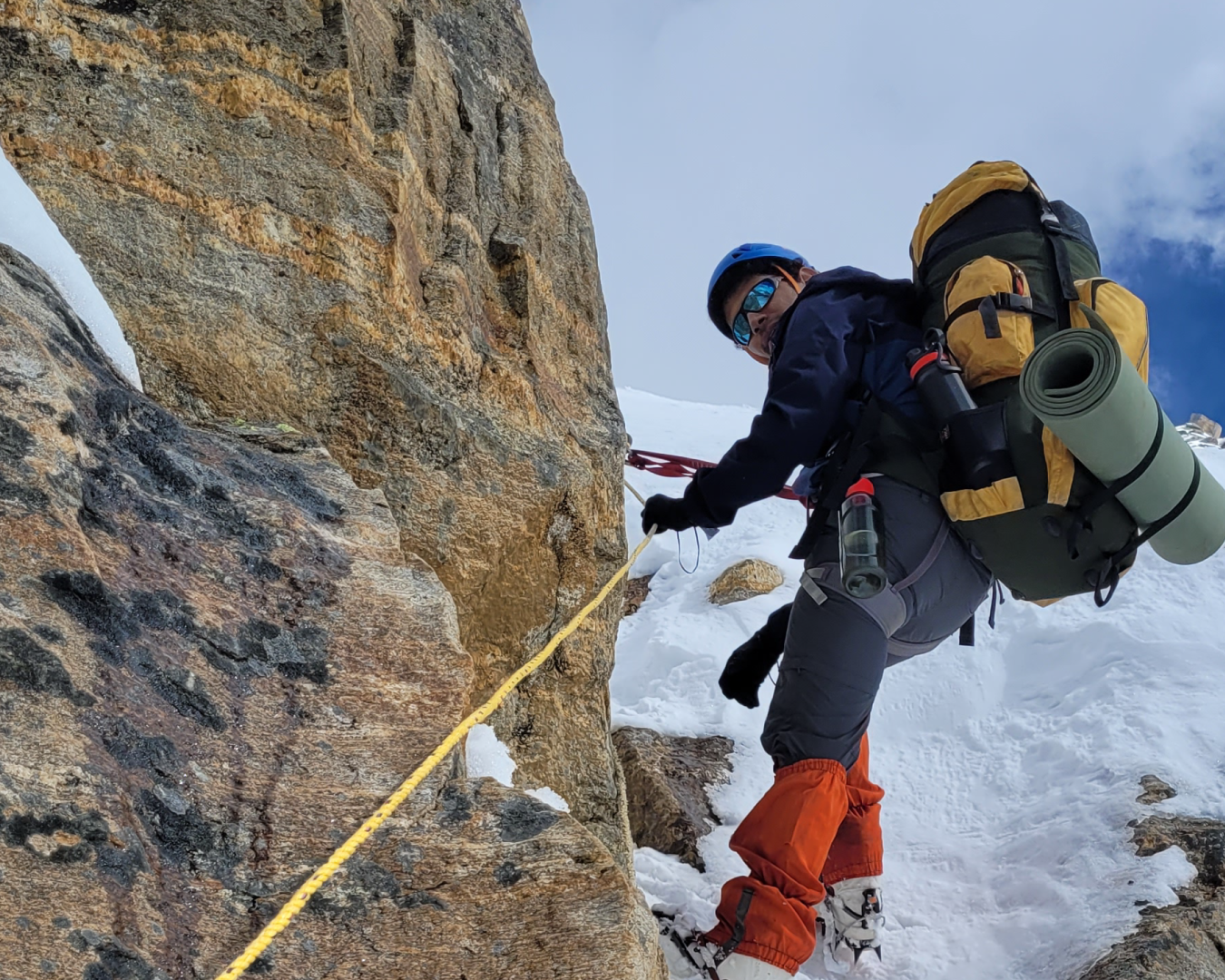
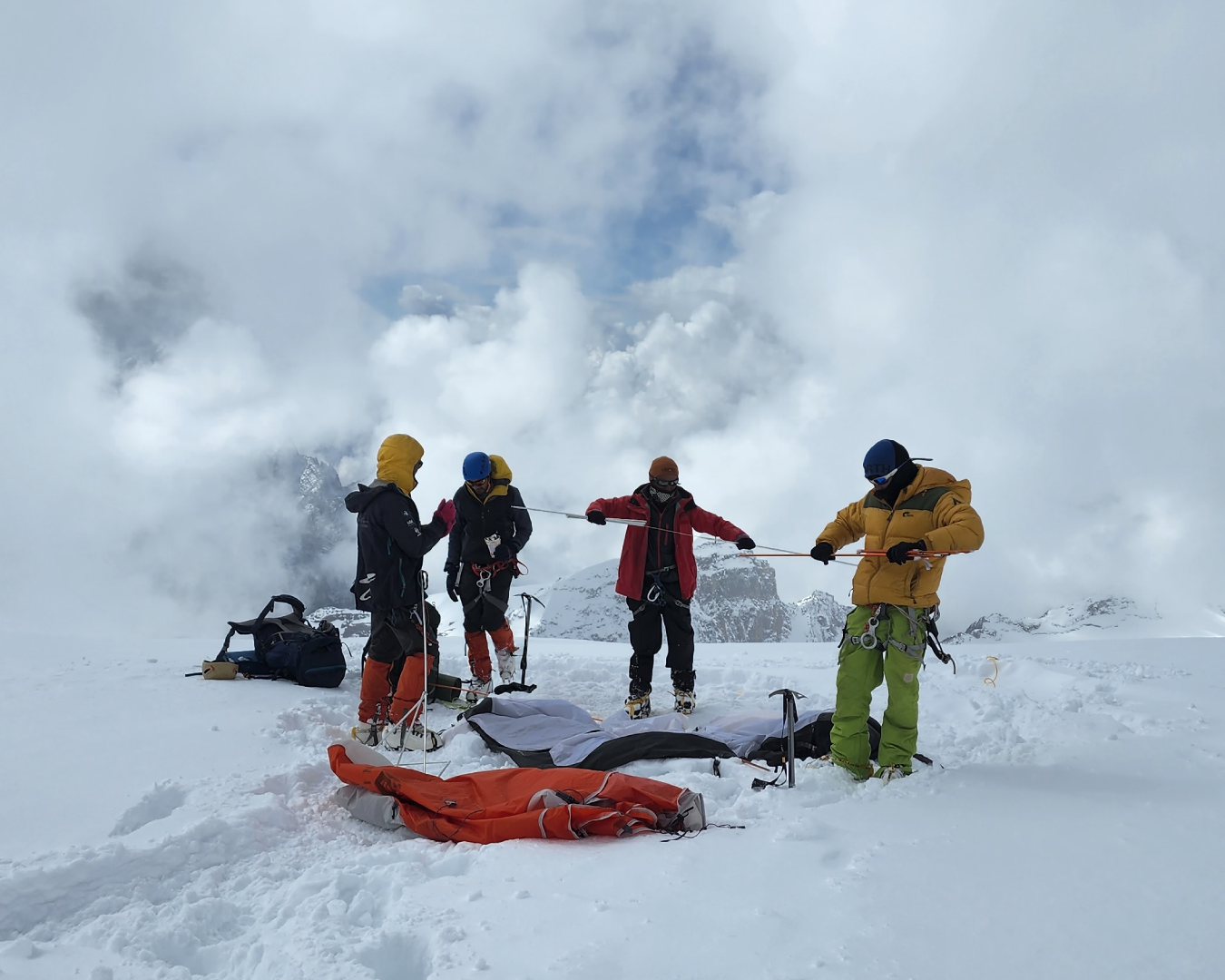
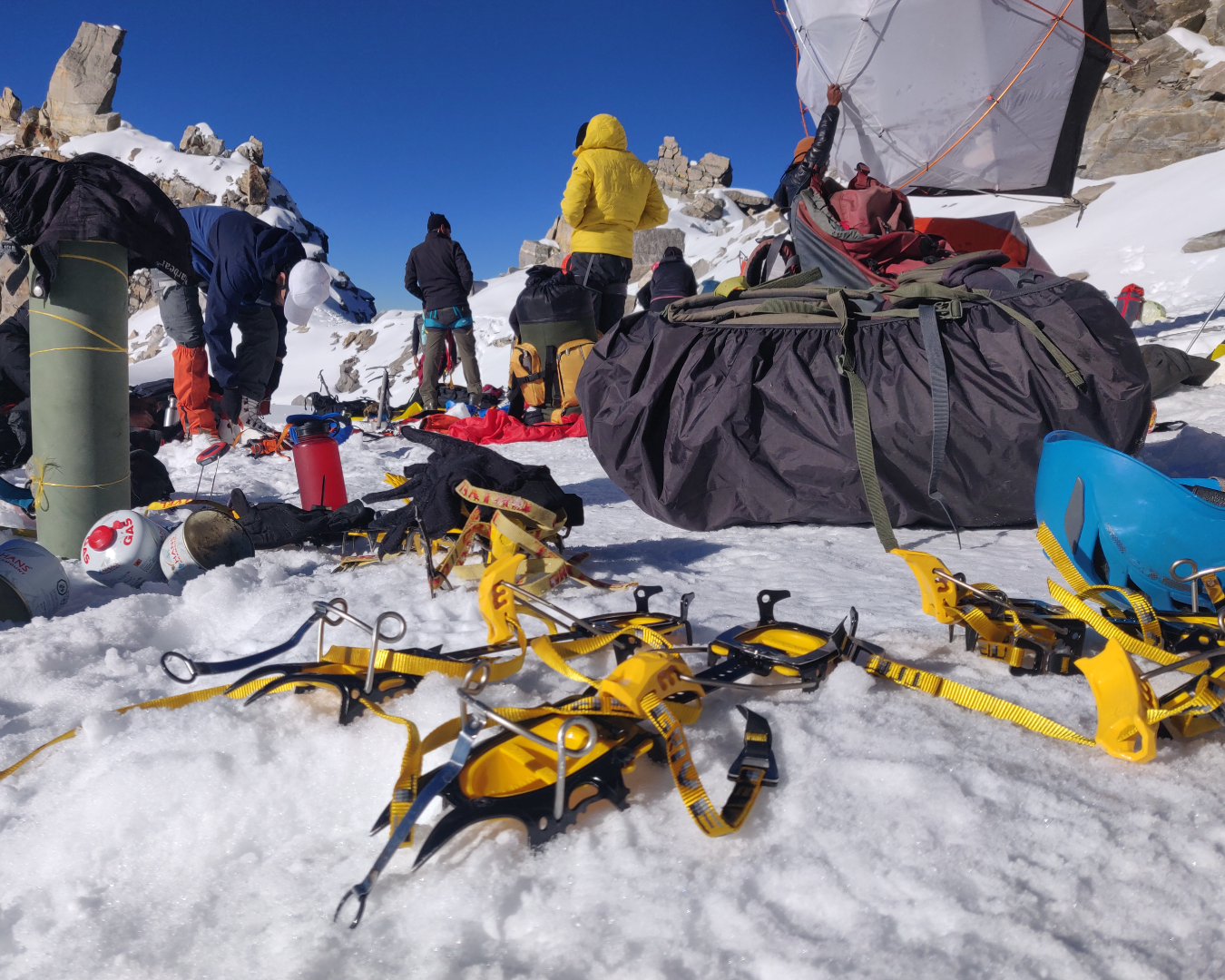
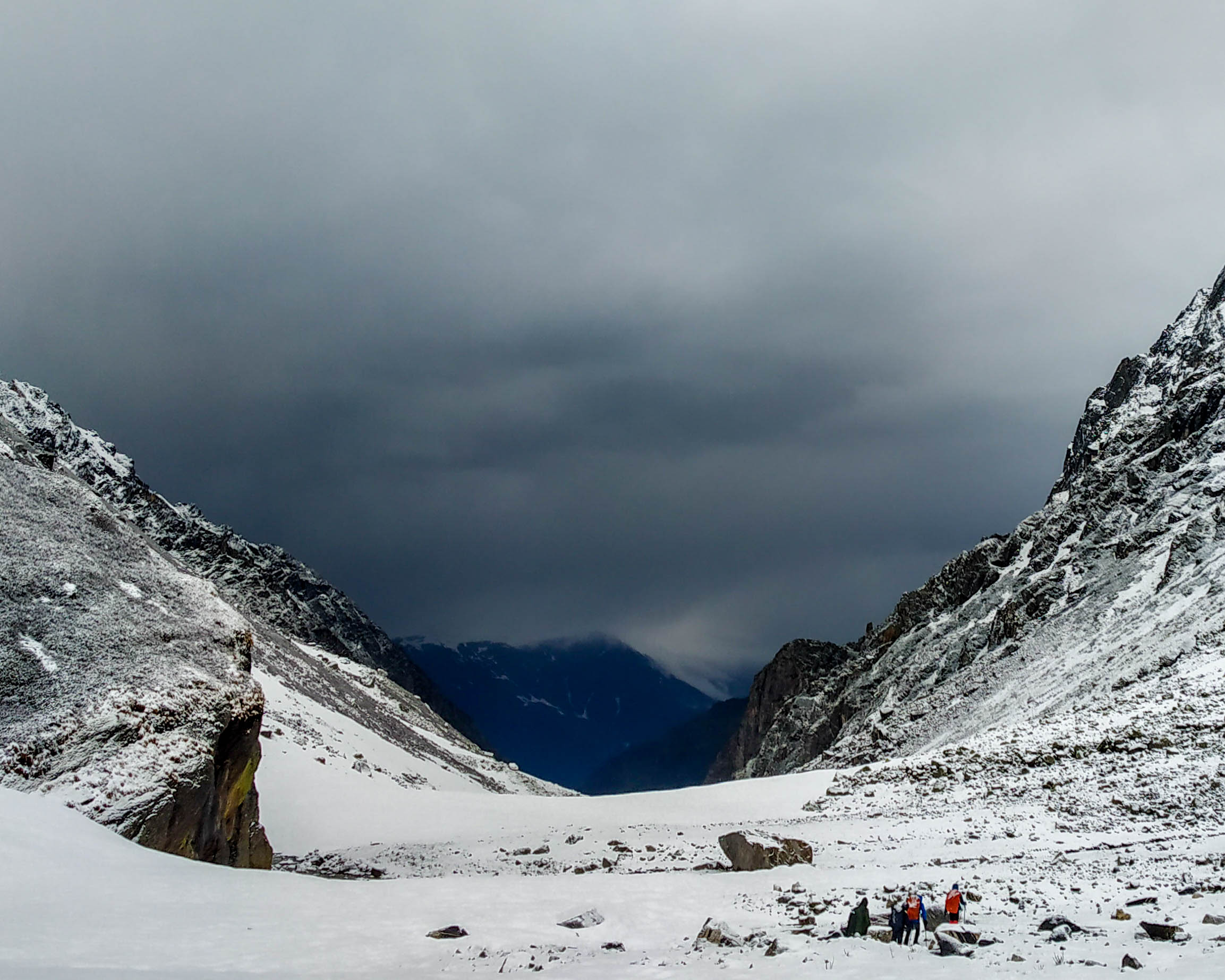
Similar Adventures
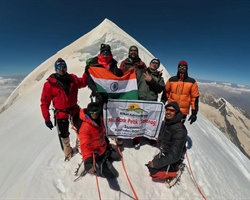
Mt. Black Peak
The Highest Peak of the Saraswati Range of Mountains - Technical Expedition meant for Experienced Trekkers
Uttarakhand
16 Days
BRS 7
6387 m
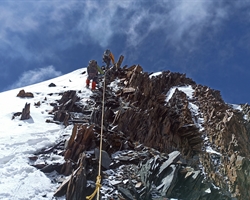
Mt. CB 13 and CB 14 Expedition
An Extreme Climb for the Extremely Courageous -Highly Technical Expedition meant for Experienced Climbers
Himachal
16 Days
BRS 7
6264 m
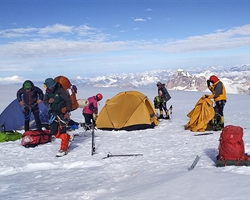
Mt. Nun Peak
The Roof of Ladakh- A Highly Technical Expedition meant for experienced climbers only.
Ladakh
23 Days
BRS 8
7135 m
